Entropy and enthalpy - Study guides, Class notes & Summaries
Looking for the best study guides, study notes and summaries about Entropy and enthalpy? On this page you'll find 494 study documents about Entropy and enthalpy.
Page 2 out of 494 results
Sort by
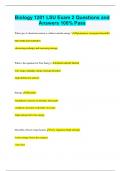
-
Biology 1201 LSU Exam 2 Questions and Answers 100% Pass
- Exam (elaborations) • 14 pages • 2024
- Available in package deal
-
- $9.99
- + learn more
Biology 1201 LSU Exam 2 Questions and Answers 100% Pass What type of chemical reaction is without outside energy? Spontaneous (exergonic/downhill) NOT INSTANTANEOUS -decreasing enthalpy and increasing entropy What is the equation for Free Energy? deltaG=deltaH-TdeltaS -free enrgy=enthalpy-(temp.)(entropy;disorder) -high deltaS=low delta G Entropy Disorder: -breakdown: increase in disorder, more parts -synthesis: decrease in disorder, less parts -high entropy=low free energy ...
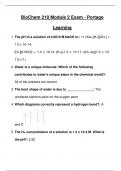
-
BioChem 210 Module 2 Exam - Portage Learning
- Exam (elaborations) • 7 pages • 2023
- Available in package deal
-
- $10.49
- 1x sold
- + learn more
BioChem 210 Module 2 Exam - Portage Learning 1. The pH of a solution of 0.0010 M NaOH is:: 11 (Kw=[H+][OH-] = 1.0 x 10-14; [H+][0.0010] = 1.0 x 10-14 [H+]=1.0 x 10-11; pH=-log[1.0 x 10- 11]=11) 2. Water is a unique molecule. Which of the following contributes to water's unique place in the chemical world?: All of the answers are correct 3. The bent shape of water is due to ______________.: The unshared electron pairs on the oxygen atom 4. Which diagrams correctly represent ...
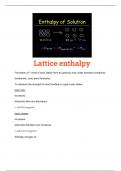
-
lattice enthalpy and entropy, born haber cycles chemistry notes
- Summary • 9 pages • 2024
-
Available in package deal
-
- $4.00
- + learn more
summary notes on lattice enthalpy, born-haber cycles, enthalpy of solution, entropy and free energy and feasibility. including example calculations and diagrams from the textbook
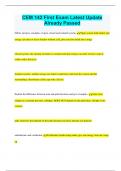
-
CEM 142 First Exam Latest Update Already Passed
- Exam (elaborations) • 24 pages • 2024
- Available in package deal
-
- $9.99
- + learn more
CEM 142 First Exam Latest Update Already Passed Define and give examples of open, closed and isolated systems Open system-both matter and energy can enter or leave (beaker without a lid, pour your hot drink into a mug) Closed system- the amount of matter is constant and only energy can enter or leave (cup of coffee with a lid on it) Isolated systems- neither energy nor matter would move between the system and the surroundings (Styrofoam coffee cup with a lid on) Explain the dif...
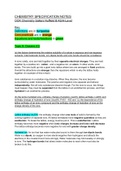
-
OCR Chemistry B (Salters-Nuffield): Topic 8 O (Oceans) summary
- Summary • 11 pages • 2023
-
Available in package deal
-
- $5.35
- 1x sold
- + learn more
This is a summary of every learning objective (a-j) for Topic 6, CI on the OCR Chemistry B (Salters-Nuffield) specification. I have arranged my notes answering each objective, and have given definitions, equations, techniques, and other notes based on the textbook and my lessons. These notes include solubility, enthalpy level diagrams, entropy, acid and base equations, buffers, the greenhouse effect, and more. I used these notes for my Chemistry exams in 2022 and achieved an A*, and I am now...
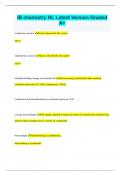
-
IB chemistry HL Latest Version Graded A+
- Exam (elaborations) • 9 pages • 2024
-
Available in package deal
-
- $9.99
- + learn more
IB chemistry HL Latest Version Graded A+ exothermic reaction heat is released by the system ΔΗ<0 endothermic reaction heat is absorbed by the system ΔΗ>0 standard enthalpy change of reaction(ΔΗ) the heat energy transferred under standard conditions (pressure-101.3 kPa, temperature- 298 K) combustion and neutralization are exothermic processes average bond enthalpy the energy required to break one mole of a certain type of bond in the gaseous state averaged acro...
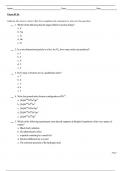
-
Test Bank for Chemical Principles, 8th Edition by Peter Atkins
- Exam (elaborations) • 558 pages • 2024
-
- $29.49
- + learn more
Test Bank for Chemical Principles: The Quest for Insight 8e 8th Edition by Peter Atkins; Loretta Jones; Leroy Laverman; Kelley Young; James Patterson. Full Chapters are included (Focus 1 to Focus 10 are included) Focus 1: Atoms 1A Investigating atoms 1B Quantum theory 1C Wavefunctions and energy levels 1D The hydrogen atom 1E Many-electron atoms 1F Periodicity Focus 2: Bonds Between Atoms 2A Ionic bonding 2B Covalent bonding 2C Beyond the octet rule 2D The properties of bonds 2...
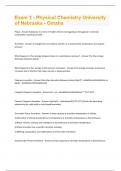
-
Exam 3 - Physical Chemistry University of Nebraska - Omaha Questions with well explained answers
- Exam (elaborations) • 7 pages • 2024
- Available in package deal
-
- $9.79
- + learn more
Phase - Answer-Substance in a form of matter which is homogeneous throughout in chemical composition and physical state Transition - Answer-A change from one state to another at a characteristic temperature and a given pressure What happens to free energy between phase in a spontaneous process? - Answer-The free energy decreases between phases What happens to free energy as the pressure increases? - Answer-Free energy increases as pressure increases due to the fact that molar volume is al...
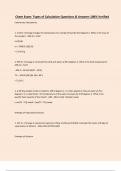
-
Chem Exam: Types of Calculation Questions & Answers 100% Verified
- Exam (elaborations) • 25 pages • 2024
- Available in package deal
-
- $17.49
- + learn more
Chem Exam: Types of Calculation Questions & Answers 100% Verified Calorimetry Calculations: 1. 2.50 kJ of energy changes the temperature of a sample of lead by 8.52 degrees C. What is the mass of the sample? - ANS-Q = mcΔT m=Qc/Δt m = 2500/0.13(8.52) = 2.3×103 g 2. 950.3 J of energy is removed from 28.5 g of water at 80.3 degrees C. What is the final temperature? - ANS-Q = mcΔT −950.3 = 28.5(4.18)(T2 − 80.3) T2 = −950.3/(28.5)(4.18) + 80.3 = 72.3O C 3. A 30.56 g sample...
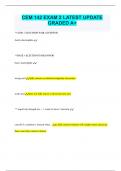
-
CEM 142 EXAM 2 LATEST UPDATE GRADED A+
- Exam (elaborations) • 9 pages • 2024
- Available in package deal
-
- $9.99
- + learn more
CEM 142 EXAM 2 LATEST UPDATE GRADED A+ **ACID = ELECTRON PAIR ACCEPTOR Acid= electrophile **BASE = ELECTRON PAIR DONOR base= nucleophile strong acid fully ionizes in solution/completely dissociates weak acid does not fully ionize or dissociate into ions ** negatively charged ion ---> wants to loose 1 electron can tell if a solution is ionized when... a fully ionized solution will conduct more electricity than a non fully ionized solution strength of acid depend...

How did he do that? By selling his study resources on Stuvia. Try it yourself! Discover all about earning on Stuvia


